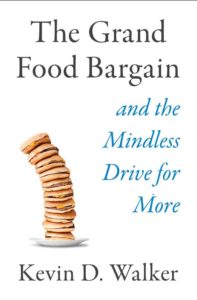Join Health Affairs for a virtual conversation between me and Angela Odoms-Young of Cornell University discussing the evolution of US food and nutrition policy, the current policy landscape, and thoughts on what lies ahead. It’s at 1:00 p.m. EDT. To join the Webinar, register here.
by Marion Nestle
Mar
15
2019
Weekend reading: The Grand Food Bargain
Kevin D. Walker. The Grand Food Bargain and the Mindless Drive for More. Island Press, 2019.

I did a blurb for this one:
A former USDA insider’s account of what our Grand Food Bargain—a system focused on ever-increasing production of cheap food—actually costs Americans in poor health, environmental degradation, and loss of agrarian values and community. Walker’s views are well worth reading for his insights into how our food system needs to be transformed
Some snippets:
- Early farm bills, sold to the public by promising more food with less uncertainty, were designed to stabilize food prices and increase farm income. Eight decades later, new farm bills are still being enacted despite average farm income long ago surpassing non-farm income and continuing food surplus. Each new bill is an increasingly costly grab bag of subsidies and protections, which invariably attracts more interest groups and lobbying. Other than loose connections to agriculture, no coherent policy direction exists (p. 91).
- Narrow [scientific and technical] expertise alone, for example, does not address the connections among rising rates of obesity, exhaustion of fossil waters, escalating nitrous oxide in the atmosphere, noxious weeds immune to legacy pesticides, growing antibiotic resistance—all the result of how the modern food system operates and how society now lives (p. 114).
- As sophisticated financial strategies are grafted onto the modern food system, more mergers and acquisitions by ever-larger multinational companies follow. Food is no longer valued for its ability to sustain life, but only for its ability to generate profits. Whether higher returns come from squeezing farmers under contract to grow pigs or poultry, creating a monopoly on seeds that can be doused with chemicals, or selling food laden with cheap calories makes no difference (p. 141).
Walker’s remedy? Let food be our teacher. It’s worth reading what he means by this.

